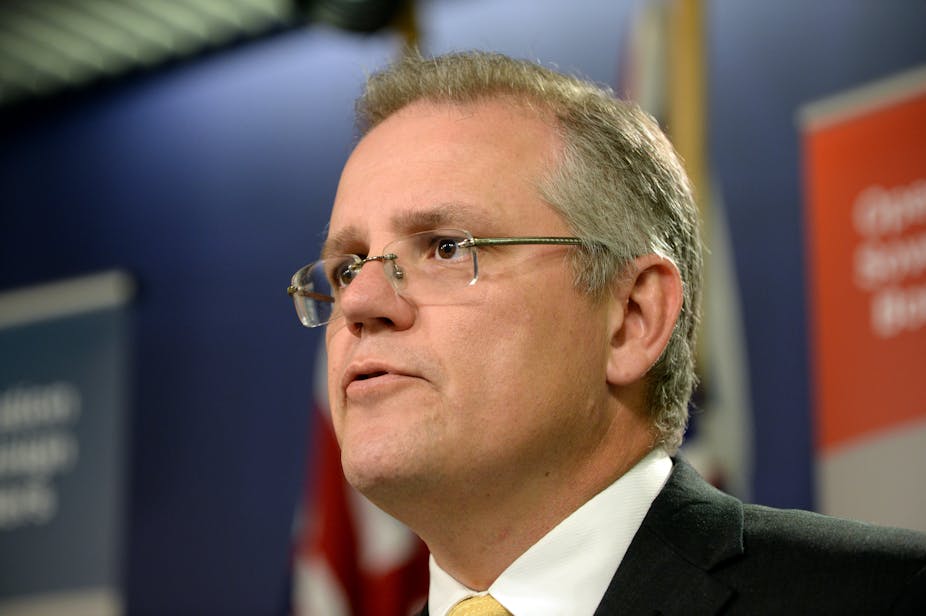Immigration minister Scott Morrison is new to government, but he is a seasoned campaigner on Australia’s response to boat people. He knows how to get attention on this issue and he knows how to use the attention he gets.
This week, word emerges that Morrison has directed Department of Immigration and Border Protection staff to change the language they use to characterise asylum seekers who arrive by boat, and the department has duly relayed these instructions to its contractors in the immigration detention system.
Arguably the most important question here is how far the department’s staff will go to incorporate the minister’s preferred phrasing into their work. It is an early test of the independence of the public service under Tony Abbott. We may have an answer within the month.
Morrison’s instructions include directing staff to replace the phrase “asylum seeker” with “illegal maritime arrival”, and to replace “client” with “detainee” (onshore) or “transferee” (offshore). Challenged about these instructions, Morrison has defended them as a step away from “political correctness”, in favour of “calling a spade a spade”.

In one sense, you have to credit Morrison’s defence. For a system of immigration detention, the previous Labor government’s word “client” had been a blatant euphemism. Detainee and transferee are much more honest. If “illegal maritime arrival” seems less respectful than asylum seeker, more scornful of the United Nations convention that Australia has ratified, those are probably also reasons to call it more honest.
Against that, the language’s very honesty raises a question of sincerity about the policy’s broader rationale. If your main care was to save boat people from “the drownings”, or from the depredations of people smugglers, why would you spend so much time and effort vilifying them?
History suggests a fairly simple answer to this question. Whereas author and former diplomat Tony Kevin and others called the government’s punitive approach to boat people responsible – along with other factors – for the massive loss of life that occurred when SIEV-X sank in 2001, in 2010 the drownings were recast in popular imagination as a result of relaxed policy.
In other words, the punitive approach was originally developed without any real regard for safety of life at sea; drowned boat people only got cast as support for the punitive approach years later – a bolt-on argument for policy that was up and running anyway.
Read back over Australia’s daily newspapers from the second half of 2001 and the earlier rationale is strikingly clear. As John Howard said, a critical mass of people wanted to “decide who comes to this country”. He said it passionately; he said it rhythmically; but above all he said it to a Liberal Party conference and to a broader electorate filled with people keen to believe it.

Meanwhile, this week, many of the Labor politicians who were responsible for Canberra’s latter-day “stop the drownings” policy rationale have remembered their pre-2010 distaste for “demonising asylum seekers”. Labor’s is a preference for the previous euphemisms, for the pretence of respect: don’t give up the punitive deterrence towards boat people, but use nice words when you lock them away.
Labor’s essentially dishonest language reveals the dilemma that confronts the party. Its strategists reckon swinging voters want tougher enforcement, and won’t trust a switch from deterrence to incentive-based policy.
On the other hand, the same strategists also know they cannot mobilise a durable progressive movement unless many of their potential supporters currently lined up with the Greens and smaller parties of the left forgive Labor’s big lurches to the right in 2001 and 2013. Opposition leader Bill Shorten’s near-apology a week ago for Labor’s own “illegal” rhetoric shows this is a strategic concern they recognise — even if they don’t care to acknowledge it openly.
The Liberal Party has no such dilemma. Its active supporters want essentially the same policy approach as the swinging voters prefer. Except for that minority of party members who have ethical objections to the deterrence approach, Morrison’s attitude is a logical one.
On ABC1’s Q&A program this week, Labor’s Tony Burke said that “Scott Morrison would love this debate” about the change in language. He explained that discussing the language draws attention to this government’s toughness against boat people. Sitting on the same panel, neither Barnaby Joyce nor Amanda Vanstone challenged Burke’s claim.

Michelle Grattan has questioned Morrison’s phrase trickery in a piece for The Conversation today. I think the essence of the trick, though, is that it involves no tricking. Morrison and his colleagues know they don’t have to lie, to reframe, or to euphemise on this issue. So why in the name of holy political advantage wouldn’t they go for it? Vilify away! Call a spade a spade!
Australia’s boat people have become a byword for “wedge politics” since 2001, to their enduring dismay. Liberal Party leaders can say what they truly want and believe on this issue – openly and clearly, without reservation. When they do, their allies support them and their adversaries divide against each other.

